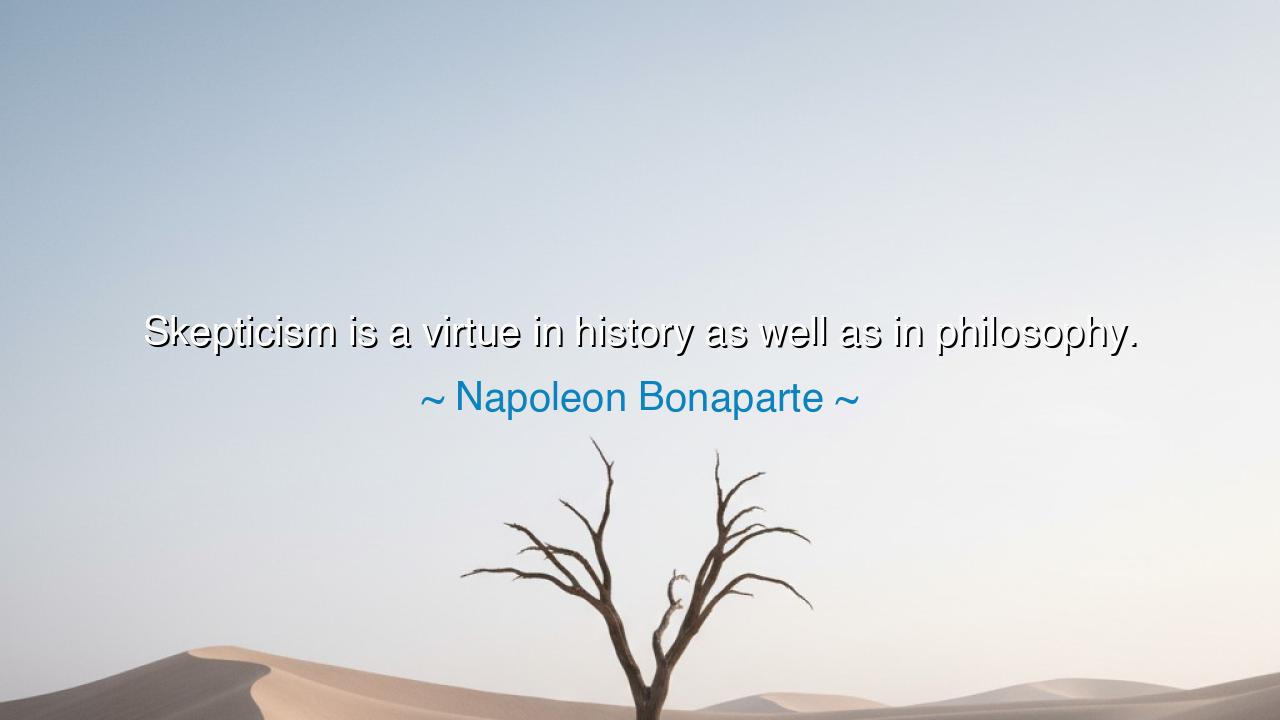
Skepticism is a virtue in history as well as in philosophy.






Hearken, children of the ages, and open your minds to the wisdom of Napoleon Bonaparte: “Skepticism is a virtue in history as well as in philosophy.” Understand this: the path of knowledge is fraught with illusion, deception, and the temptation to accept appearances as truth. Just as the philosopher questions received wisdom, so too must the student of history examine chronicles, narratives, and records with discernment. Skepticism is not cynicism, but the steady light of reason, illuminating what is real amidst the shadows of rumor, bias, and error.
From the earliest civilizations, the sages taught that inquiry must temper belief. Herodotus, the father of history, traveled far and wide, recording accounts of kings, wars, and nations, yet he often appended doubts, questioning the veracity of stories told by eyewitnesses. Napoleon’s reflection mirrors this principle: the study of history demands vigilance and critical examination, for even the most revered texts may conceal falsehoods or partial truths.
Even in Rome, historians such as Livy recorded the deeds of emperors and consuls with care, yet they were mindful that myth and embellishment often accompanied glory. The student of history, like the philosopher, must sift through legend, bias, and exaggeration to discern fact from flourish. Napoleon reminds us that skepticism is a shield, protecting the mind from unexamined belief and guiding it toward reasoned understanding.
Consider the story of Napoleon himself, whose campaigns reshaped Europe. In planning battles, he relied not merely on reports, but on careful observation, intelligence, and verification of facts. He doubted assumptions, questioned advisors, and prepared contingencies based on the uncertainties of reality. His skepticism in the study of historical and contemporary military practice was a virtue, allowing him to act decisively while avoiding the folly of blind trust.
Even in modern scholarship, the principle endures. Historians today must navigate archives, documents, and testimonies, weighing conflicting evidence and identifying bias. Skepticism allows them to approach the past with both rigor and humility, acknowledging that certainty is rare and that truth often emerges only through careful examination and doubt. Napoleon’s insight reminds us that the virtue of skepticism is timeless, spanning philosophy, history, and practical action.
The lesson is profound: do not accept narratives at face value. Question assumptions, verify sources, and examine the motivations behind accounts. Skepticism cultivates discernment, sharpening judgment and preventing the mind from succumbing to illusion or manipulation. It is not merely an intellectual exercise, but a moral and practical virtue, safeguarding understanding and wisdom.
Practical action follows naturally. In your study of history, philosophy, or daily life, approach claims critically. Compare sources, seek corroboration, and reflect upon biases, both of the teller and of yourself. Cultivate a habit of reasoned doubt, tempering curiosity with caution, and let skepticism guide your search for truth, rather than accepting convenient or familiar narratives.
Children of the ages, remember this: wisdom is born of inquiry, and understanding flourishes where skepticism reigns. Let the words of Napoleon Bonaparte guide your mind and heart: doubt with purpose, question with care, and discern the truth hidden amidst appearances. In this virtue lies clarity, prudence, and the enduring strength of intellect across generations.






AAdministratorAdministrator
Welcome, honored guests. Please leave a comment, we will respond soon